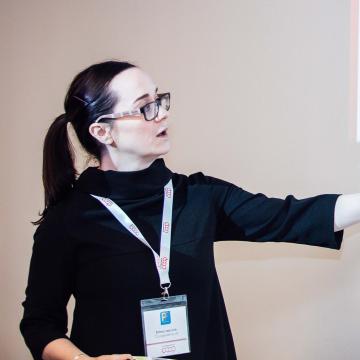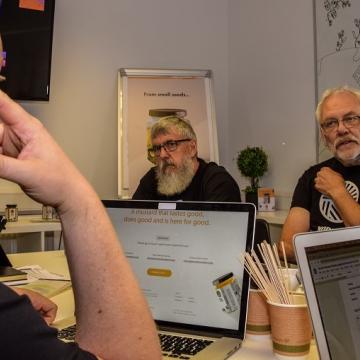Policy governance – a liberating approach to complex co‑op business
Case study

When a Manchester co‑operative realised its governance wasn’t working, it adopted an alternative approach, which now enables it to innovate, diversify and operate much more effectively.
Jonathan Atkinson is a founder member of Carbon Co‑op – a community benefit society with ambitious plans for tackling climate change.
Carbon Co‑op provides the tools, knowledge and services people need to reduce their energy use – and a whole lot more. They’re busy with many projects – and with numerous, often complex activities on the go, they’ve found governance to be a challenge.
“We’re trying to do ambitious things that are technical, innovative and new,” said Jonathan. “That can be overwhelming for a board, especially when it’s made up of members who don’t have a professional technical background in what we’re doing.”
When Jonathan and his colleagues were working on a complex construction project, they found it put a strain on governance. He said: “It became an agenda item that would dominate entire meetings.
“There were concerns over risks and liabilities – and considerable time was spent explaining often difficult-to-understand technical information.
“This became stressful for our board members. Some stopped coming to meetings and they started to step down from the board. We had difficulties being quorate and having the minimum number of board members there to make decisions.”
Change was needed. So Jonathan turned to Co‑operatives UK for assistance. He said: “They were helpful and gave us a lot of support and advice. Invaluably, they signposted us to a couple of Guardian articles by Dave Boyle, who drew inspiration from ‘policy governance’ – an approach that is very popular with co‑ops on the east coast of the USA.”
So, what is policy governance and how does it differ from the traditional form of governance co‑ops tend to adopt?
“It’s a framework with its own set of distinctions and jargon, which can be challenging at first, but becomes second nature once you adopt it,” Jonathan added.
“Policy governance frees up each group of a co‑op’s stakeholders to do what they are best at. The board, staff and members all have an input in an appropriate way. It sets out their roles, how they communicate and are accountable to each other.
“In traditional governance, you have minutes and officers who table reports. A subject is discussed and board members weigh in with their thoughts and reflections.
“However, when a co‑op is doing something quite technical, board members with limited understanding will discuss a report with well‑meaning but uninformed suggestions. The dynamic that occurs is often one of benign befuddlement. Policy governance does away with that.”
Using policy governance, the board – as a voice for membership – sets out the co‑op’s ‘Ends.’ These are the goals and aims the organisation is trying to achieve. “For us, that’s tackling climate change and creating an equitable transition to net zero,” said Jonathan.

Policy governance empowers staff to do whatever they need to do to achieve the ‘Ends’ the board defines. It frees up people with technical expertise to pursue the co‑op’s aims how they see fit.
“As well as the Ends, there’s also a set of Limitations,” Jonathan explained. “This means you can do anything you need to do to without stepping beyond certain parameters. For example: don’t break the law, don’t mistreat staff and don’t exceed the budget.
“Using this framework, our reporting occurs every two months. What’s presented at the meeting is: how staff have worked to achieved the Ends; and how they’ve stayed within the Limitations.
“Carbon Co‑op has seven Ends. We discuss one or two at each meeting, so each End is reviewed on an annual cycle. We demonstrate outputs and outcomes, which means the board is not weighing in on what we should be doing but rather evaluating the success of the impact on the organisation.
“It’s been transformational. What were long meetings are now very efficient reports on what we’ve achieved. Attendance at meetings is really high and it’s been successful in maintaining member engagement via the board. It has solved our governance crisis and given us a firm governance platform to work from.
“In the past seven years, we’ve embarked upon numerous projects to achieve our ends. We recently did something with Andy Burnham’s team, setting up a citizen jury that advocated for a co‑operatively owned energy market in Greater Manchester.
“We’ve also led on Oldham Energy Futures – a project to explore how transforming power can benefit local people, as well as being green. And we’re pioneering an innovative scheme to enable renewable energy to cope with spikes in demand.
“We wouldn’t have that diversity of projects if we used top‑down governance. Policy governance lends itself to the range of responses required to tackle the climate emergency.
“It would be great if we could create a community of interest in policy governance in the UK. We’ve recently been working with Loco Homes in Scotland, supporting them to adopt it. If anyone wants to speak to us about it, contact us at [email protected].”
Need advice or support with your co-op’s governance?

Carbon Co-op: Combating the climate and cost of living crises

What is good governance?

Co‑operatives: getting governance and oversight right
